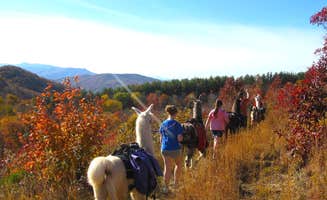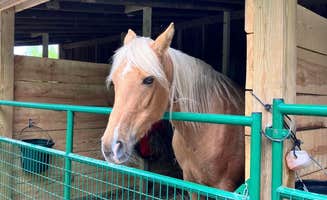Equestrian camping near Bean Station, Tennessee offers access to mountainous terrain across the Tennessee-Virginia border with elevations ranging from 1,200 to 3,500 feet. The area receives approximately 45 inches of rainfall annually, creating lush forest conditions along horse trails. Camping options include both dedicated equestrian campgrounds and mixed-use facilities where trail riders can access connecting routes.
What to Do
Mountain biking on maintained trails: Panther Creek State Park Campground features diverse trail systems for cyclists of all abilities. "The mountain biking was so much fun we didn't care! Hiking and biking was an A+. Great place for families because of the surrounding wooded activities," notes Penny M. The park maintains over 60 miles of trails suitable for both hiking and mountain biking.
Fishing in creek-side locations: Clinch River Family Campground provides direct water access for anglers. "Great place to camp along side the creek or rv lots with mountain views. Walking distance to Clinch River. Kayak, Hiking, Biking, spacious lots," says Andy J. The river system supports several trout species with best fishing conditions in spring and early summer.
Wildlife observation at dawn: Cataloochee Campground offers exceptional elk viewing opportunities in the Great Smoky Mountains. "We spent 5 nights and watched them early am and afternoons every day. They will get up close-and personal. The rangers keep a watch out, tho, and try to warn u if they are coming too close," explains Jodie K. October through December provides prime rutting season viewing.
What Campers Like
Creek sounds throughout the night: Big Creek Campground tent sites position campers near flowing water. "The camp is beautiful and you are surrounded by the magical sounds of rushing water. There are two creeks nearby, one big and one small," reports Alison W. Several sites offer direct streamside access while others maintain proximity to the sound.
Historical structures within walking distance: Campers appreciate Cataloochee's preserved heritage. "There are historical homesteads, a school, churches and cemetery to take you back in time. Trails by creeks there to hike," mentions Jodie K. These structures represent early settlement patterns from the 1800s throughout the region.
Well-maintained bathroom facilities: Townsend-Great Smokies KOA receives positive reviews for cleanliness. "Fantastic bathrooms and showers. Laundry was on point as well. The river is beautiful," notes Steve D. Many equestrian campgrounds offer only primitive facilities, making clean bathrooms a notable amenity when available.
What You Should Know
Road access challenges for larger vehicles: Access to Cataloochee Campground requires navigating difficult terrain. "Access to Cataloochee is via a narrow, winding, mountain road. A 3-mile stretch of gravel road contains many narrow, blind curves. Though many campsites will accommodate large rigs, motorhomes over 32' and trailers over 25' in length are not recommended due to the access road," explains Kristina. Similar access issues affect many horse camps in the region.
Variable cellular coverage: Connectivity becomes limited in mountain areas. "We needed to work and do school while there and the Verizon cell service was limited and the WiFi signal was not great at our rig," reports John at Townsend-Great Smokies KOA. Most equestrian camping areas have minimal or no cellular service.
Seasonal facility limitations: Many campgrounds reduce services seasonally. "Pool closes before Labor day," notes Nicole H. about Panther Creek State Park. Facility availability frequently changes with seasonal staffing, particularly in horse camps where water may be turned off during freezing periods.
Tips for Camping with Families
Playground proximity: Panther Creek State Park offers multiple recreation options for children. "Panther creek has great hiking trails, pool, playground fire pits and so much more! The campground tends to be quiet and relaxed and has full hookups on some of the sites along with a nice little store and the dump station," shares Bill P.
Wildlife education opportunities: Children can observe native species at established viewing areas. "Lots of wildlife here, even a rescued barred owl to view near the gift shop. It can get lively throughout the day, but most people are respectful and keep the noise down at night," mentions Dusty W. about Panther Creek State Park.
Tick prevention essential: Prepare for insects common in horse camping areas. "Though if you come in the summer look out for ticks. Panther Creek is notorious for ticks. I pulled 6 off of me in one day," warns Dusty W. Horse camps typically have higher tick populations due to large mammal presence.
Tips from RVers
Site selection for privacy: At Panther Creek State Park, specific sites offer more seclusion. "I had a very cute camp spot up in the woods away from the road it was number 50 it was so cute and quieter than the rest of the spots. It also had two fire pits one up by the tent area and one down by the picnic table," shares Jennifer M.
Leveling requirements: Terrain at most regional campgrounds requires preparation. "The sites in the upper curve are bigger then the ones on the hill. There are several that offer tent pads and small vehicle pads. Check your lengths and bring your leveling boards," advises Shelly S. about Panther Creek. Many equestrian sites are particularly uneven due to heavy use.
Advance planning for holiday periods: Popular campgrounds fill quickly during peak seasons. "We come here every year. Always helpful and it's beautiful. The campground is very well kept. We spend thanksgiving here every year," notes Nicole B. about Townsend-Great Smokies KOA. Most equestrian camping requires advance reservations, particularly during spring and fall riding seasons.




